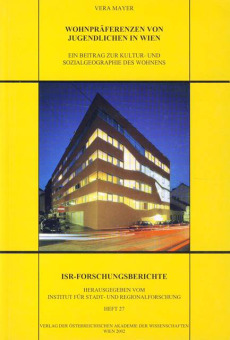Vera Mayer
Wohnpräferenzen von Jugendlichen in Wien
Ein Beitrag zu Kultur- und Sozialgeographie des Wohnens
Herausgegeben von Institut f. Stadt- u. Regionalforschung d. Österr. Akademie d. Wissenschaften
Reihe: Forschungsberichte des Instituts für Stadt- und RegionalforschungDie neuen Lebensstile, der Wandel und die Ausdifferenzierung des Wohnens sind wesentliche Teilphänomene urbaner Transformationen, die von der Stadt- und Wohnbauplanung neue Lösungen verlangen.
In dieser Studie geht es um die Entwicklung einer neuen Sozial- und Kulturgeographie des Wohnens im urbanen Raum. Das Ziel ist die Erstellung eines neuen theoretischen und methodischen Forschungsrahmens sowie neuer inhaltlicher Fragestellungen für den Bereich der urbanen Wohnkultur. Die Wohnweisen, Wohnwünsche und Wohnvorstellungen der Jugendlichen stehen dabei im Vordergrund. Im theoretischen Teil werden die bisherigen Forschungsansätze kritisch überprüft und neue Forschungszugänge erschlossen. Im empirischen Teil geht es um die Vorstellungen der Jugendlichen über den gewünschten Wohnort, die präferierten Haus- und Wohnformen, die Wohnqualität (etwa die Größe der Wohnung, die Infrastruktur, die Lage und Verkehrserschließung), die Finanzierung dieser Wünsche und schließlich auch um die Vorstellungen der Jugendlichen hinsichtlich der zukünftigen Familien- und Arbeitsformen. Es geht um die Erfassung und Analyse der Wohnpräferenzen von Jugendlichen als eines kulturellen Phänomens im Rahmen der Aspekte Raum, Wohnen, Arbeiten, Freizeit, Mobilität, Konsum, Wohnleitbilder, Ideologie, Politik und Nachhaltigkeit. Eine historische Betrachtungsweise ist in diesem Zusammenhang unumgänglich. How young people in Vienna wish to live has rarely been examined because of the low social and political power this age group has in terms of living conditions in society.
…
New life styles and the transformation of and differentiation in housing conditions are essential phenomena of urban transformation and demand new solutions for urban and house-building planning. The aim of this project is to develop a new social and cultural geography of life in the urban space. The main aim of this study is the empirical coverage and analysis of young people”s ideas on housing and their preferences as cultural and social phenomena.
The theoretical section reviews previous research and develops a new theoretical and methodical research framework. The empirical section is about the various forms of housing occupied by young people at the moment. The first section sets out problems concerning their ideas on housing preferences, life-styles, location, size and age of accommodation. The second section discusses problems concerning young people”s infrastructure preferences in their immediate environment as well as their living habits, including questions concerning mobility, work, shopping, leisure time and ecological aspects. The third group of problems deals with the legal aspects and the financing of the accommodation of their choice. The fourth group of topics inquires into the values and ideas of young people concerning the kind of family and work they would like to have in the future. Finally, the influence on housing construction of individual young people”s preferences for certain ways of living is demonstrated.
